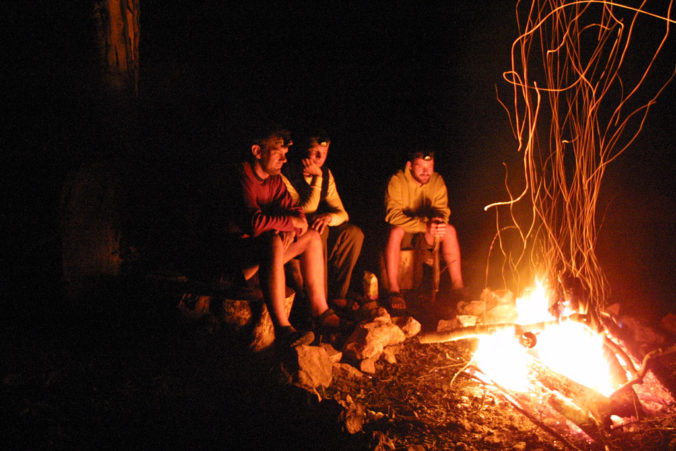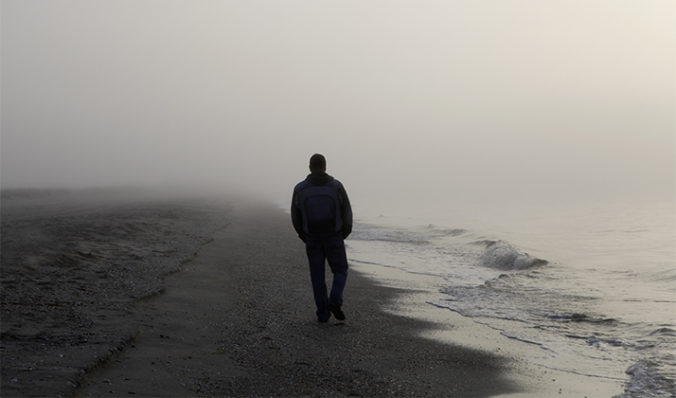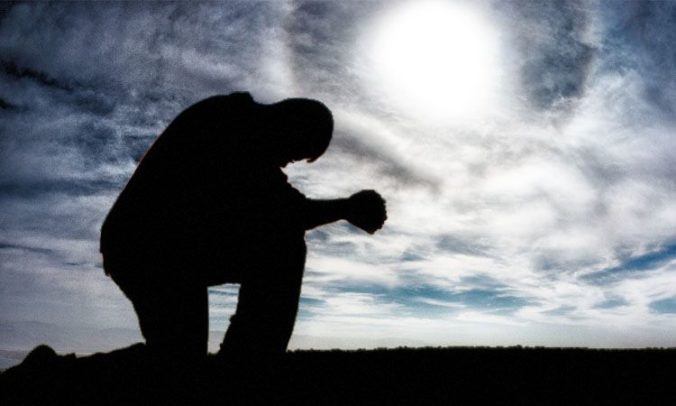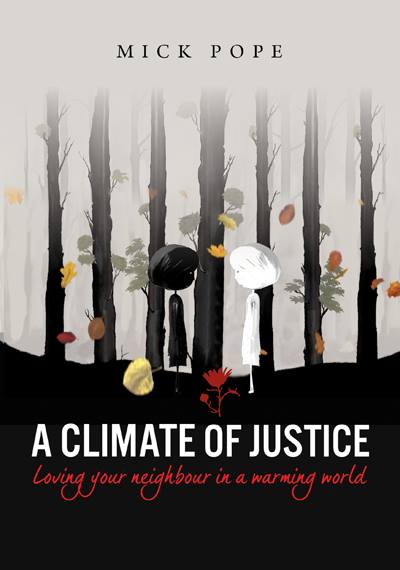SIGHT-SEEING: THE STRENGTH OF VULNERABILITY
In 2010, researcher and speaker, Brene Brown, gave a TED talk on vulnerability which quickly went viral. It has now been viewed more than 33 million times. Why did Brown’s talk have such an explosive impact? The simple answer is that she touched something deep inside people that spoke to what they were feeling but somehow couldn’t express, something we all intuitively knew.
Page 2 of 53
“There is absolutely nothing about shame and honor and fear in the gospel of Jesus Christ.”
“The god that most people fear, the god who can’t wait to punish and torture you in an eternal hell is not the God of the Bible.”
I need to have this drummed into me over and over again. And I suspect many of you do too. This article will hopefully help.
Love – No Fear · Christianity Without the Religion/Plain Truth Ministries
1 Corinthians 13 is a chapter many have come to know as the “love chapter” of the Bible. 1 Corinthians 13 is arranged in three separate sections, two of which we will briefly examine: The first section, in verses 1-3, is about love as being indispensable.
As I move forward in this life, I realise more that I can’t take for granted the personal growth I have already attained. I can’t rest on it. As I’ve said previously, the human heart is deceitful. When I’m going well I can fool myself that I can sit back and be complacent and rely on myself when in fact I need to stay out of the way of my own penchant for self-protection rather than love.
The good I did yesterday certainly counts, and it strengthens me, but it doesn’t guarantee that I will be surrendered again to God today. In the same way, if I was selfish and hurt people yesterday, that doesn’t guarantee that I will stay in that today. That is the great thing about forgiveness and grace. You can get up again anytime, straight away. I don’t have to stay in the shame of my past actions. God wants us to live. You can’t do that when you choose to stay stuck.
All we have is today. There is a saying that talks about living just for today. There is no point ruminating about yesterday’s mistakes, its aches and pains. Yesterday is gone and is never coming back. Similarly, tomorrow is not something we need to be anxious about; it hasn’t arrived yet. We can’t do anything about it. We can live surrendered today and therefore be stronger tomorrow, but it’s today that is what matters.
My past, good or bad, doesn’t define me. We are not what we do, and we are not what our minds often tell us. That’s where Descartes (‘I think, therefore I am’) was wrong. When our minds tell us that we are not worth getting to know, we can reject that for the lie that it is. You are not your mind.
I read an article yesterday about how the latest brain research says that we can physically rewire our brains by retraining them with the truth of who we are. When we get into the habit of retraining our brains, new neural pathways are physically created in our brains so that, the more we practise good habits, the easier they become to do.
What defines us is the fact that every single one of us has inherent dignity. The destructive things I have done in my life don’t mean I’m a bad person. Likewise, I can’t rest on the good things I have done in the past. I can easily undo them much faster than I built them up. That’s why I need to be in touch with myself every day.
Living for today is what matters to me. That can be misunderstood in terms of sucking the pleasure out of life and not caring about the consequences for tomorrow. That is exactly not what this means. That is actually being destructive and living out of our false self. Our true self, the us that God made and wants to release, is the self that lives for today without worrying about the shame of yesterday’s misdeeds or the uncertainty of tomorrow. It is the self that is present today, present to love, to surrender and therefore to joy no matter what life throws at you today.
Learning to live is learning to live on life’s terms, not on the terms I demand. The greatest prayer that I know to help with this is the Serenity Prayer:
God, grant me the serenity to accept what I can’t change, the courage to change what I can, and the wisdom to know the difference.
It’s a prayer of living in love, in grace, in forgiveness, in the present and in courage. I’m thankful that God answers such prayers, because I can’t do that on my own. I need outside help. And I only need to do it today.
Jesus really confuses me at times.
When I look at his life, I see that he got pretty frustrated a lot of the time. He would say things like, “how long do I have to put up with you?!”, he called a Gentile woman a dog, and he seemed to always get angry pretty quickly at the Pharisees.
When you disagree with someone, the worst thing you can do is attack them. They’re just going to become more defensive and hardened in their position. Surely Jesus would have realised this. He seemed to have wisdom beyond his years, and he never lost debates. So what was his purpose in calling his enemies snakes and hypocrites? Surely he realised it wasn’t going to go down well with them.
Most of us realise that it’s best to reason with someone when you disagree with them. You try to find points of commonality where you agree, and go from there. You don’t attack them personally. You tell them that you see where they might be coming from even though you disagree, but you’re open to being shown to be wrong. Even if you have a strong conviction about what you’re saying, you attack the argument, not the person.
So, why would Jesus just provoke more animosity and inflame already tense situations? It doesn’t sound very mature. It just sounds hot-headed and reactionary. As someone who has decided to follow Jesus, this sort of reaction is not something I think is a wise idea to emulate.
One reason I have been told as to why Jesus responded like this was that he was basically wrong. The idea is that what we are seeing when he does this is his full humanity, where he, like any of us would, gets frustrated at times, loses his cool and doesn’t respond like he would want to. We all do that. This is not saying he wasn’t divine, but it is saying that he was subjected to the same human frailties we are.
Part of me is attracted to this type of Jesus; I can relate to him. But another part of me is disillusioned by him, and confused. Jesus is someone we are supposed to follow; being Christlike is what I have dedicated my life to. So, if I find that Jesus made mistakes along the way, which parts of him should I follow and which parts should I not? And, if he made mistakes, does that mean he wasn’t perfect? Does it mean that he sinned?
We all have our own images in our heads of what the people we want to emulate are like. I remember being terribly shocked once in my teens when, as a conservative young Christian, I saw a photo of my hero, Martin Luther King, smoking a cigarette. When I saw that photo, the first thought that ran through my head was, “maybe he wasn’t a Christian after all?” In my circles at the time, Christians didn’t smoke. If you did, you weren’t really fully surrendered to God.
I’m still not really sure why Jesus responded in certain ways to people. I struggle to see how him being fully human still means that he did things wrong. Is my idea of perfection all wrong? Did he really need to be sinless to be the Son of God and die for our sins? If he is not the perfect example to follow, I just feel more lost.
A book I’m reading at the moment attempts to provide some answers to my conundrum. It’s called ‘Jesus Behaving Badly’, by Mark Strauss. The book looks at Jesus’ apparent anger issues, his apparent sexism, racism, disdain for the environment (cursing the fig tree), and other areas of his life in which he behaved ‘badly’. It’s helpful but it still leaves me with questions.
In the end, I still believe Jesus was sinless. I have to admit though, that I need him to be sinless so that I can have something to anchor my life on, that I can follow him in trust. That doesn’t mean that I have to respond in exactly the same way he would; Jesus after all had his own personality and was a product of his environment. If he was here in person today, he might respond differently in what is a completely different culture to the one in which he lived 2,000 years ago.
The bottom line I know is that I too, just like Jesus, am trying to grow into maturity. I can hang onto the ultimate command to love, knowing that I am loved unconditionally, despite the huge sins I have committed in my life. And I know that the Spirit of God within me guides me to be more loving, and gives me the power to live as I ought and as I really want.
When I am surrendered to God’s Spirit, more of my true self is released, the self who has the courage to love, whether or not I am loved in return, to live with courage and not self-protection.
This, for the time being at least, helps me deal with some of my confusion.
The insanity of resentment is that it is always about us, it is always us that is hurt by it (because often the person we are resenting doesn’t even know about it), yet we think that our resentment is going to show them how wrong they have been.
On top of that is the fact that insanity is doing the same thing over and over and expecting a different result. I think it was Einstein who said that we can’t solve a problem with the same mindset that gave us the problem in the first place.
When I resent someone, it is really all about me. The other person has generally done nothing wrong, and even if they have, my resentment is still all about me. It is about how hurt I feel about not feeling heard or understood.
There is something in me that rages against the injustice that nobody understands. And sometimes that’s true. Too many people have not been listened to and heard as children, and it comes out as destructive behaviour in adulthood.
Martin Luther King said that violence is the language of the unheard. He didn’t condone the violence, but he did understand it. There is a huge difference. We can’t do anything about times in our childhood when we should have been heard but weren’t, but we can do something now.
I found a meme the other day that said that change happens when the pain of staying the same is greater than the pain of change. That’s when we will deal with resentment and be able to forgive.
When I let go of resentment, by changing my attitude to one of thankfulness, or by praying for the person I am resenting, I am instantly liberated from my slavery to self-obsession. That’s the power of forgiveness. My burden is lifted and I feel free again. And I realise anew that this is how I want to live. I look forward to being reminded about this a few more times tomorrow.
I reckon humility is the hardest thing in the world.
From the moment we are born, we crave attention; we are desperate to be heard. It’s a normal human need. But even those who were brought up with the most loving and attentive parents have still had to deal with a deficit of attention. And so we spend our lives trying to get ourselves heard, our insides sometimes screaming for someone to just listen to us. We exalt ourselves, desperate to let people know how great we are. But humility teaches us the opposite; it teaches us that the ego has to die if we are to live.
When I am around people who have stuffed their lives up but are now recovering, I find their humility awe-inspiring and challenging. These people teach me what humility really is and in the process they show me how judgmental, arrogant and ‘superior’ I often am.
When you’re around truly humble people, those who know their own brokenness because it’s so obvious that there is just no hiding it, you see how far short you fall. But at the same time you don’t feel shamed by them. Humility has no interest in shaming anyone. It quietly, just through its actions, shows you a better way. That was the amazing balance of Jesus’ life. He loved people in their brokenness, and just by that, showed people how far short they fell. But he never shamed them. The only people he warned that they were in real trouble were the ones who were convinced they weren’t.
When I realise how far I fall short of the mark of humility, I actually can’t imagine myself ever being truly humble. My only hope is to ask God to do it for me.
I’ve made some huge mistakes in my life, with massive consequences. And yet I still find myself feeling judgmental and superior a lot of the time. That says much more about me than it does about those people.
To find out a bit more about what it might look like to actually be humble, I recently went back to a Christian classic from two decades ago, Philip Yancey’s What’s So Amazing About Grace?. Towards the end of the book, Yancey recalls Jesus’ meeting with the woman at the well in John 4. Instead of being moralistic and telling the woman how immoral she was by living with a man who was not her husband in that culture, he said, in effect, ‘I sense you are very thirsty,’ and proceeded to show her that the water she was drinking would never satisfy her, and then offered her something that would, forever.
Yancey then explains, “When I am tempted to recoil in horror from sinners, from “different” people, I remember what it must have been like for Jesus to live on earth. Perfect, sinless, Jesus had every right to be repulsed by the behaviour of those around him. Yet he treated notorious sinners with mercy and not judgment.” And yet I, who have caused so much havoc in my life, still have the gall to think I am better than others.
All this makes me want to sit at the feet of Jesus more. It was the rotten ones, the thieves, prostitutes and liars who flocked to Jesus because he accepted them for who they were. The Pharisees were shockingly offended when Jesus had the nerve to tell a story of how a tax collector, and not a ‘righteous’ religious person like a Pharisee, was actually more pleasing in God’s sight because the tax collector was humble and cried out to God for mercy.
It’s the notorious sinners who I want to be around, because I am one of them. I feel more comfortable with them than I do with the pious, self-righteous and judgmental ones; the latter remind me too much of myself.
I was watching an old episode of the TV show, NCIS, tonight. At the end of course, Gibbs and his team once again solved the crime, put the bad guys away, and right won out.
It reminded me that, as we enter a new year, I am convinced that the Christian story is still needed for our society. We need to be constantly reminded of the story that good wins in the end, where evil is never worth it and where we know it in our bones, just like we know that we need air to stay alive.
I don’t think our society has hope in ultimate goodness; we haven’t had it for a long time. Deep down we know we want it, and we teach our children about it. But we are so bombarded with the incessant messaging that money, sex and fame will give us what we want that it is no wonder that we chase these fleeting seductions to our deaths. The glitz, lights and glamour blind us to the reality that we are careering towards a powerful waterfall, getting ever closer to the edge.
When we see immature people get elected to positions of world-influencing power, and other powerful leaders line the pockets of their rich mates while the battlers continue to struggle and get sold lie after lie about how they just need to suck it up and wait, it is easy to forget the ultimate story of goodness triumphing in the end.
Martin Luther King’s famous line that the moral arc of the universe is long but it bends towards justice, is the hope the world needs today. We doubt this story, both in our own lives and through the avalanche of daily news we are confronted with. We become addicted to behaviours, substances and ways of thinking, desperate to regain that lost hope we once had. We are told that life is about economic growth because we no longer have hope in ultimate goodness.
I literally need a daily reminder of the story of goodness winning. Otherwise I forget. A line of a song from the brilliant John Mellencamp expresses it best for me:
“Hey Jesus this world is just too troublesome for me. I try to fight off all these devils but I’m just too weak.”
I need to be reminded daily that goodness will win in the end, that while the arc of the moral universe is long, we really will see ultimate justice one day. That’s why the end of the Book of Revelation, that most misunderstood and terribly misinterpreted of books, is so pivotal for me. In the second last chapter of the whole Bible, we are told that, “He will wipe every tear from their eyes. There will be no more death or mourning or crying or pain, for the bold order of things has passed away.” Then we are told that he who is seated on the throne is making everything new.
I need to hear that for my own life, in my brokenness when I am yet again faced with my flaws. And I believe the world needs to hear it and believe it, to let it sink into our bones, that there really is hope, that we really can believe that good wins in the end, that we don’t need to doubt, that we can be freed from our compulsions and live for good because it is ingrained into us.
That is my hope and prayer for 2018.
BOOKS: EXPLORING THE LINKS BETWEEN CLIMATE CHANGE AND (BIBLICAL) JUSTICE
“The main point that A Climate of Justice brings out is that climate change is a poverty issue and an issue of justice. Discussing in detail issues such as global poverty, the treatment of asylum seekers, the plight of our indigenous brothers and sisters, and how works of advocacy are vital for sustained change, Pope brings us the latest research to show how our changing climate is contributing to the difficulties people in these situations are facing.”
Christmas.
For some of us it conjures up images of family, laughter, connection and fun. For others, just the very word triggers stress, busyness and just wanting it to be over with. And for others it only triggers pain, loneliness and dread.
A former pastor of mine used to remind us every year that Christmas is a time when the lonely are lonelier and the poor are poorer.
As I sit alone in my apartment, I know what it is to be alone, and sometimes I feel lonely. But then I sit still and remind myself that I am actually not alone, not in the sense of ultimate aloneness. I am loved, I am ok, I am good.
It can be hard though if you don’t have family around, if you’re old and no one ever visits, if you feel forgotten. Loneliness is an epidemic in our busy culture, and Christmas is the loneliest time of all for thousands of people.
As one of my new favourite songs says,
“Sometimes
The air is so anxious
All my thoughts are so reckless
And all of my innocence has died
Sometimes
I wake at four in the morning
When all the darkness is swarming
And it covers me in fear
Sometimes, sometimes, sometimes
Full of anger and grieving
So far away from believing
That any sun will reappear”
When you wake in the middle of the night and there is no one next to you; that’s when you feel it. And all you can do is lie there with the aloneness. You can pray and sometimes you might have a sense of God being close and sometimes you might just feel like your prayer stops at the ceiling. It can be hard when you’re alone, especially at Christmas.
If you are lonely this Christmas, you are in good company. The baby whose birth we remember also found himself alone a lot in his life. From the very time of his birth, he was hunted. The Christmas story is good news, wonderful news, news of hope, but the occasion of Jesus’ entry into the world was nothing like what we see in the nice, saccharine, sickly Christmas cards in our shops.
Jesus was forgotten, denied, betrayed, and still he went forward in love. He personified what love is, because love gets rejected; love is often lonely because it is not returned. Jesus opened himself to rejection because he loved. And that rejection came, and he was lonely. He reminded his best friends of that when he said that “when you are hated by the world, remember that it hated me first.” He knows what it is to be lonely.
If you are alone you are never ultimately alone. And it’s because of Christmas. You are remembered, you are loved; in fact you are cherished.
It’s in the difficult times that I remember I need God, that I surrender and find the home my heart craves. Christmas is the greatest news in the world. If you don’t feel loved this Christmas, this is a love like no other. You are understood, you are heard, you are seen. And you are never alone.
Finally, read Romans 8:38-39.












